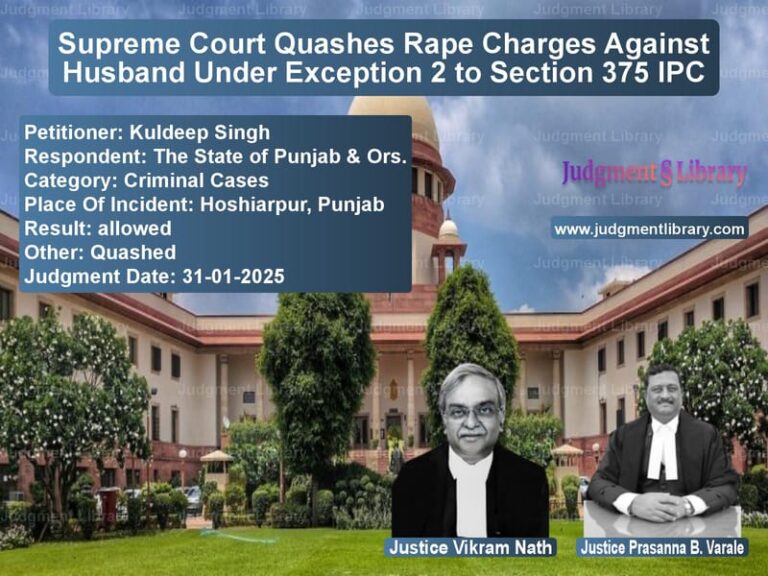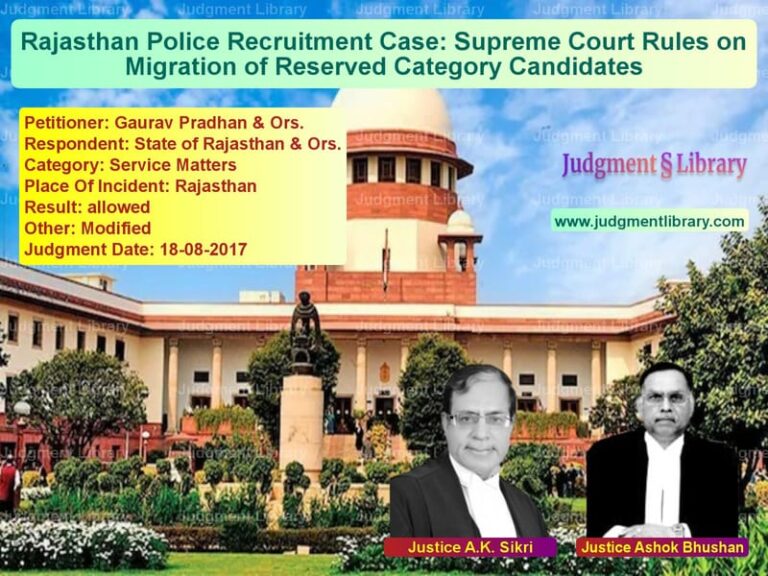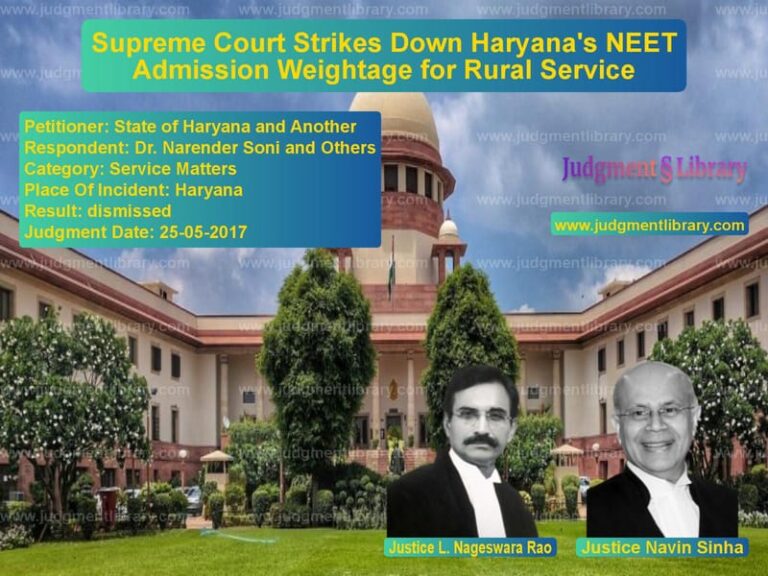Regulation of Foreign Contributions and Political Organisations: Supreme Court Rules on Ambiguities in the Foreign Contribution (Regulation) Act, 2010
The case of Indian Social Action Forum (INSAF) vs. Union of India revolved around the constitutional validity of certain provisions of the Foreign Contribution (Regulation) Act, 2010, and the Foreign Contribution (Regulation) Rules, 2011, concerning the regulation of foreign contributions to organizations. The appellant, INSAF, a non-governmental organization, challenged the provisions that gave the government wide powers to restrict foreign contributions to organizations deemed to be of a political nature.
Background of the Case
The appellant filed a writ petition before the High Court of Delhi, challenging the constitutionality of Section 5(1) and Section 5(4) of the Foreign Contribution (Regulation) Act, 2010, and Rule 3 of the Foreign Contribution (Regulation) Rules, 2011. INSAF argued that these provisions were overly broad, vague, and violated the constitutional rights guaranteed under Articles 14, 19(1)(a), 19(1)(c), and 21 of the Indian Constitution.
The dispute began when INSAF, a registered society involved in promoting civil, political, and social rights, was barred from accepting foreign contributions due to the applicability of the provisions in question. The appellant claimed that the restrictions on foreign contributions would undermine its ability to carry out its legitimate activities.
The primary issue for consideration was whether the provisions violated the constitutional guarantee of freedom of speech and association under Articles 19(1)(a) and 19(1)(c), and whether they were arbitrary or unreasonable under Article 14.
Petitioner’s Arguments
The petitioners, represented by Senior Counsel Mr. Sanjay Parikh, argued that:
- Section 5(1) of the Act conferred uncanalized power on the Central Government to designate an organization as one of a political nature, without providing clear guidelines or safeguards against arbitrary decision-making.
- Rules 3(i), 3(v), and 3(vi) of the Foreign Contribution (Regulation) Rules were overly broad and vague, enabling excessive executive discretion, leading to the potential for misuse of power.
- The provisions violated the fundamental rights of the petitioner, particularly Articles 14, 19(1)(a), and 19(1)(c), by arbitrarily limiting access to foreign contributions for civil society organizations that promote democracy, secularism, and human rights.
- Restrictions on foreign contributions imposed by the Act and Rules had a chilling effect on freedom of speech, expression, and association by curtailing the ability of non-political organizations to engage with international partners.
Respondent’s Arguments
The Union of India, represented by Additional Solicitor General Mr. K.M. Nataraj, defended the validity of the provisions. The respondent argued:
- The provisions of the Act and Rules were enacted to safeguard national security and ensure that foreign contributions did not unduly influence Indian politics or policies.
- The restrictions imposed by the Act were reasonable and aimed at ensuring that foreign contributions were not used to fund organizations involved in political activities, which could harm the country’s democratic fabric.
- Article 19 of the Constitution does not guarantee the right to receive foreign contributions. Thus, the appellant’s claim of violation of Articles 19(1)(a) and 19(1)(c) was misplaced.
- The guidelines under Rule 3 were in line with the legislative intent to prevent misuse of foreign funding by organizations with political affiliations.
Supreme Court’s Observations
The Supreme Court examined the provisions of the Foreign Contribution (Regulation) Act, 2010, and the Rules in the light of constitutional principles. The Court made the following key observations:
- Vagueness and Overbreadth of Rules: The Court noted that Rule 3 of the Foreign Contribution (Regulation) Rules indeed had broad definitions of “political interests” and “political activities,” which could lead to arbitrary action. However, the Court also emphasized the principle of “reading down” provisions to save them from unconstitutionality.
- Legislative Intent: The Court observed that the legislative intent behind the Act was to safeguard national interests and prevent foreign influence on politics. However, the Court also acknowledged the importance of ensuring that legitimate organizations working for social causes were not unfairly penalized.
- Impact on Fundamental Rights: The Court analyzed whether the provisions of the Act and Rules violated the right to freedom of speech and expression (Article 19(1)(a)) and the right to form associations (Article 19(1)(c)). It concluded that the restrictions on foreign contributions did not violate these fundamental rights, provided that the restrictions were applied fairly and transparently.
- Interpretation of “Political Interests”: The Court noted that while the term “political interests” used in Rule 3(v) could be seen as vague, it should be interpreted in the context of active politics or party politics. It held that organizations whose activities are not directly related to party politics or political actions should not be unduly restricted from receiving foreign contributions.
Final Judgment
The Supreme Court dismissed the appeal, ruling that:
“The provisions of the Foreign Contribution (Regulation) Act, 2010, and Rules 3(i), 3(v), and 3(vi) are constitutional, but they must be interpreted with the understanding that they apply only to organizations involved in active politics or political activities.”
The Court also stated that the government must apply these provisions in a manner that respects the constitutional rights of non-political organizations, ensuring that they are not unfairly penalized for engaging in activities related to civil, political, social, and cultural rights.
Impact of the Judgment
This ruling has significant implications for the regulation of foreign contributions and the rights of civil society organizations:
- Clarity on Political Organizations: The judgment clarified that only organizations involved in active politics or party politics are subject to the restrictions imposed by the Foreign Contribution (Regulation) Act, ensuring that non-political organizations are not unduly penalized.
- Ensuring Fair Application of Laws: The Court emphasized the need for fair application of laws and prevented arbitrary executive action, safeguarding the rights of organizations working on social causes.
- Respecting Fundamental Rights: The judgment upheld the importance of freedom of speech, association, and the right to engage in global collaborations, ensuring that these rights are not unfairly curtailed.
This case highlights the delicate balance between national security concerns and the need to protect the rights of organizations to function without undue government interference, setting a precedent for future cases concerning foreign funding and political affiliations in India.
Petitioner Name: Indian Social Action Forum (INSAF).Respondent Name: Union of India.Judgment By: Justice L. Nageswara Rao, Justice Deepak Gupta.Place Of Incident: India.Judgment Date: 06-03-2020.
Don’t miss out on the full details! Download the complete judgment in PDF format below and gain valuable insights instantly!
Download Judgment: Indian Social Action vs Union of India Supreme Court of India Judgment Dated 06-03-2020.pdf
Direct Downlaod Judgment: Direct downlaod this Judgment
See all petitions in Fundamental Rights
See all petitions in Constitution Interpretation
See all petitions in Public Interest Litigation
See all petitions in Separation of Powers
See all petitions in Judgment by L. Nageswara Rao
See all petitions in Judgment by Deepak Gupta
See all petitions in dismissed
See all petitions in supreme court of India judgments March 2020
See all petitions in 2020 judgments
See all posts in Constitutional Cases Category
See all allowed petitions in Constitutional Cases Category
See all Dismissed petitions in Constitutional Cases Category
See all partially allowed petitions in Constitutional Cases Category







